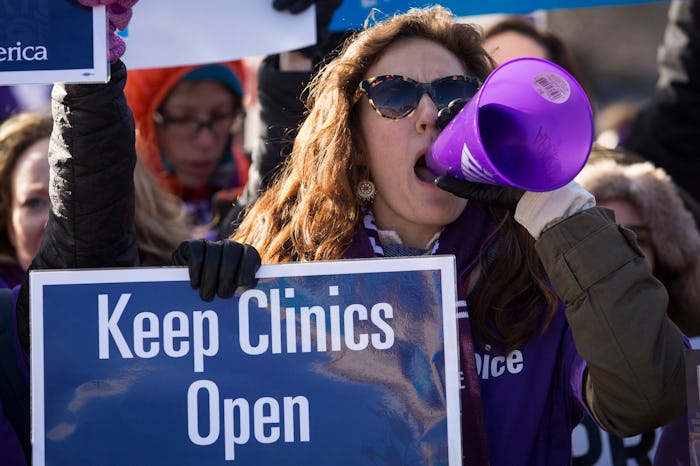
Here’s Everything You Need To Know About The SCOTUS Abortion Case
Just a day after the country celebrated the one-year anniversary of the court's legalization of same-sex marriage nationwide, the Court ruled to strike a Texas law that's already closed many clinics and made abortions even more elusive in the state. Here's everything you need to know about the SCOTUS abortion case, which is a major victory for reproductive right activists seeking to protect the right to safe and legal abortions. Some had worried that the low court ruling upholding the law would prevail in the case of a 4-4 split because the court has eight justices instead of nine right now, but it moved in a 5-3 ruling to prevent even more of the state's clinics from shutting down.
The court heard arguments in Whole Woman’s Health v. Hellerstedt on March 2, and on Monday it decided that the twofold Texas law H.B. 2 is unconstitutional. The law, according to NBC News, had whittled away the number of clinics in the state from 42 to 19. Originally passed in 2013, the law mandates that an abortion provider in the state have admitting privileges at a hospital within a 30-mile radius of the clinic, and that the clinics themselves meet the same specifications that hospitals do — requirements that those who support the law claim aim to protect women's health. The Center for Reproductive Rights, by contrast, has labeled the move "an absolute sham."
It's easy to understand why pro-choice activists viewed the law as a conservative effort to undermine the right to safe abortion under the landmark 1973 decision Roe V. Wade. Under the guise of mitigating "fetal pain," — a myth that has been consistently debunked as pseudoscience — South Carolina passed a law in May that bans abortion at 20 weeks gestation. Just 1.5 percent of abortions occur after that timeframe because those women are often "in the most desperate of circumstances," according to NARAL Pro-Choice America. The law's backers don't want to safeguard anyone's health; they're simply working to outlaw abortion.
Soon after SCOTUS announced its ruling, presumptive Democratic presidential nominee Hillary Clinton voiced her approval:
"Safe abortion should be a right — not just on paper, but in reality," she tweeted, even signing the the tweet with "-H," meaning she wrote it herself. And the "in reality" aspect of her sentiment is so important: The Guardian reported that if the Court had upheld the law in Texas, known as HB2, it would have forced all but nine of the state's clinics to close, making it incredibly difficult and time-consuming for many women to undergo the medical procedure.
The case is widely considered to be the most important SCOTUS ruling on abortion since 1992, when it determined that state law could not impose an "undue burden" on a woman's constitutional right to have an abortion, according to NBC News.
Justice Stephen G. Breyer wrote the majority opinion, asserting that H.B. 2 certainly would have done that, The New York Times reported:
We conclude that neither of these provisions offers medical benefits sufficient to justify the burdens upon access that each imposes. Each places a substantial obstacle in the path of women seeking a previability abortion, each constitutes an undue burden on abortion access, and each violates the Federal Constitution.
Indeed, H.B. 2 opponents have said that the law was unnecessary and expensive, designed specifically to put them out of business. And had SCOTUS ruled in its favor, the clinics would have been concentrated in Austin, Dallas-Fort Worth, Houston, and San Antonio, the Times reported. None would have existed west or south of San Antonio, and, according to a brief for the clinics, that's a geographic area that's larger than California.
The SCOTUS abortion case sets a legal precedent that will very likely block other similarly restrictive laws from manifesting throughout the United States. Even down one Justice, the Supreme Court on Monday championed women's rights to control their own reproductive choices safely and legally.